Remote nowBooking an appointment
Summary




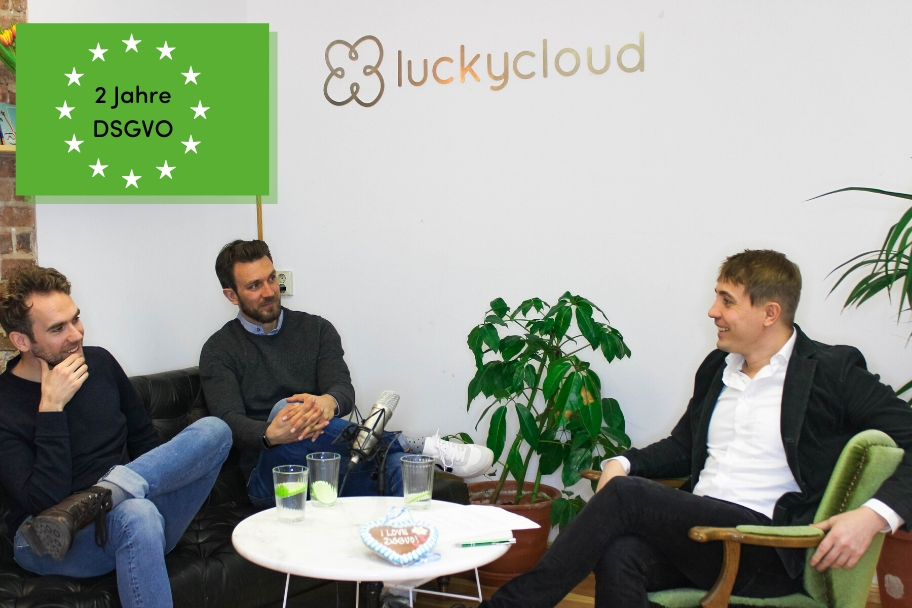
Crash course GDPR - Summary of the 10 most important facts
25th of May 2018 - since this date the GDPR came into force. Curse or blessing?
After 2 years this is not exactly one of the most popular topics for companies. Nevertheless, I think that the GDPR has an important significance in the present day. Since the GDPR came into force, not only entrepreneurs have been attaching more importance to data protection, but private individuals have also become a little more sensitive. Companies are now forced to show their subcontractors, which makes it easier to find out who is involved in data processing and where. Even if it is not always obvious at first glance, because behind the subcontractors there could be another chain of subcontractors.
Even IT lawyer, Frank Trautwein of Fresh Compliance, is of the opinion that the topic is more relevant than ever even after 2 years: "In two years of GDPR we have found strengthened data protection awareness in companies. But also significantly more active data protection authorities. Anyone who does not see data protection as a crucial management issue in 2020 should change this quickly.
High fines for GDPR infringements
The internet company Google had to pay a fine of 50 million euros in France, because it was difficult to trace how long Google was storing user data and who else was processing it. Deutsche Wohnen SE received the highest fine in Germany, amounting to 14.5 million euros, because they still illegally stored tenant data after repeated requests from data protectors. In Europe, the highest fine to date was 204 million euros, because the airline British Airways showed a lack of security precautions, which led to data theft. A list of the fines can be found in GDPR Enforcement Tracker.
Even if the high fines are the decisive extrinsic motivator for many to take the GDPR seriously. We at luckycloud took data protection seriously even before the GDPR, and have experienced that transparent communication of data processing processes should be the basis of companies that process sensitive data. After all, everyone should have the right to know where and when their own data is used and processed.
Phillipp Heindorff, lawyer at Fresh Compliance, sees it similarly: "GDPR is two years old and the Internet is bursting with cookie banners. But European data protection has achieved much more. Many companies finally recognize data protection as part of customer service. It should be a matter of course to answer a request for information about my data just as quickly as a query about my order. Privacy by Design and Privacy by Default are still far too rarely used in practice. In every data-driven project, companies should think about how to protect data in the best possible way from the outset or even work "data sparingly". Pseudonyms instead of real names, automatic deletion of geodata from a photo shoot, analysis functions are deactivated by default, the deletion of my customer data as a self service, accessible data export functions, warnings for users when entering sensitive data, etc."
There are still enough founders, companies or individuals who have not yet dealt with the topic. Therefore, in the following sections we have summarised the most important 10 facts for you, as briefly as possible, and answered the most important questions of our GDPR interview 2 years ago for you. In doing so, we refer to the most important points for us, which does not mean that there are not significantly more important aspects.
1. What is the GDPR and to whom does it apply?
The General Data Protection Regulation (abbreviated: GDPR) is a legal framework of the European Union, which is intended to harmonise the processing of personal data and is committed to fundamental rights of natural persons and in particular the protection of personal data. The regulation applies to all companies that collect, use or process personal data of EU citizens.
2. What is personal data?
Personal data are all information or records that identify a natural person, such as
- Name,
- Address,
- E-Mail address,
- Account details,
- Cookies,
- IP addresses, etc.
3 When may personal data be processed? (Art. 6-23 GDPR)
Personal data may only be processed if the following principles are followed:
Lawfulness:
In principle, data may only be processed if there is a legal basis. A legal basis is e.g. a contract, a consent or other laws (e.g. HGB, AO, TMG).
Principle of data economy:
Only as much data may be processed as is actually needed for a specific purpose.
Purpose limitation:
Data may only be used for the purposes for which it was originally intended.
Accuracy:
Data must be complete, up-to-date and correct.
Data security:
Data processors must ensure an adequate level of protection with appropriate technical and organisational measures. The level of protection depends on the need for protection of the data - if the data is particularly sensitive, higher data security measures must be used, such as additional encryption.
Right to be forgotten:
Data processors are obliged to delete or block corresponding personal data if no longer authorised. For example, an authorization no longer exists if:
- The purpose for which the data are processed is no longer given
- The consent of the person concerned has been revoked
- the data were processed unlawfully
Right to data transferability:
The data processor is obliged to assist the data subject in changing provider at the request of the data subject and to provide the data in a common format.
Accountability:
Data processors must be able to demonstrate on request that appropriate data protection management is in place in the company and that data protection principles are being observed.
"My secret tip would be to see data protection as an integral part of customer service, as customers are placing ever greater value on it. To achieve this, data protection processes must be well prepared and standardized. Authorities in particular are often called in when the answers to so-called requests for information get stuck or are not forthcoming at all. - advises Frank Trautwein from Fresh Compliance.
4. obligations for entrepreneurs (Chapter 4 GDPR)
First of all, one or more persons responsible for the implementation of the GDPR in the company must be determined - this may or may not be a data protection officer. Employees must be sensitized to the topic and data processing processes must be communicated and documented with work instructions. Among other things, records of processing activities must be created for this purpose. For customers, partners, suppliers - in short, "processors" - a data processing agreement must be concluded.
These obligations are further explained in the next 5 points.
5. Who may be data protection officer? (Art. 37 - 39 GDPR)
A data protection officer can be an internal employee who works without being bound by instructions. However, an external data protection officer can also be called. In the following video Philipp Heindorff tells you when it is necessary to appoint a data protection officer.
6. What's the processor? (Art. 28 GDPR)
The processor is a company or organisation responsible for the data processing of the principal. This includes cloud solutions, website hosting, e-mail marketing providers or other IT systems that process personal data. If you store personal data with luckycloud, then you, as the "principal" and luckycloud, as the processor, are obliged to enter into an data processing agreement.
7. What is a data processing agreement and who has to sign it?
A Data Processing Agreement (short: DPA) must be concluded with each processor. Private customers who do not process their data for a business purpose do not need to conclude a DPA.
"It should be clear by now at the latest to every data-driven company that it is necessary to conclude data processing agreements. What has become a matter of course for many companies in the meantime, still triggers queries from others. If not already done, ask the relevant data processing service providers for a "DPA". - recommends Frank Trautwein.
Part of the DPA are the so-called "TOM" and a subcontractor directory, which lists the name, location and purpose of the subcontractor's processing. Subcontractors assist the processor in processing the order.
I always find this list particularly interesting when we are looking for new applications. I have already made the experience several times that we advertise with the highest data protection measures and "100% Made in Germany", but the order is then passed on to less data protection friendly companies.
8. Who or what is TOM? (Art. 32 GDPR)
TOM is the abbreviation for technical and organizational measures. Frank Trautwein gave us a good explanation for this in our interview: "TOM is the little brother of IT and information security".
Here it is documented which measures the processor uses to ensure data security and data protection. The documentation must include the following points:
- pseudonymisation
- encryption
- Guarantee of confidentiality, integrity, availability and resilience of the systems
- measures for data recovery
- measures used for regular review, assessment and evaluation of TOMs
9. What is a records of processing activities? (Art. 30 GDPR)
Records of processing activities is a documentation of the processes in which data is processed. The documentation must be divided into the following points:
- Name and contact details of the person responsible
- Name and contact details of the data protection officer
- Category of data processing (e.g. cloud services, document destruction, archiving, etc.)
- Purposes of data processing
- Categories of data subjects
- Categories of personal data
- Categories of recipients
- Transfers of data to third countries or an international organisation
- Deadlines for deletion
- Description of the technical and organisational measures
10 How do I work GDPR compliant in the cloud? - Checklist
In principle, most cloud providers are GDPR-compliant. However, everyone has a different idea and requirement of data protection. With GDPR you get more transparency and can make your own decisions where and how your data is processed.
Basically, you first have to find a provider that meets your requirements. Here is a checklist of what you should pay attention to:
- Locations of the contract processor in Europe, or even better, in Germany
- Encryption types, such as transport encryption, client-side end-to-end encryption, server-side encryption, encryption of user passwords
- Authentication options: 2 factor authentication, authentication via LDAP
- Use of Open Source Software
- Setting recovery periods
- Subcontractor directory
- Backup concept
- Availabilities
- Work according to the Zero-Knowledge-Principle
At this point I would like to add that compliance with the GDPR is not a guarantee for high data security, but rather defines the minimum level of data protection that must be guaranteed. In addition, each company is free to decide how high they want to set data protection and data security. And the same applies to you as a client: if you have high requirements, then you should definitely consider the individual points in the checklist when making your selection.
The fact is that the GDPR is not a directive, but a regulation to which everyone who processes data of European citizens must adhere.
--
Author: Nicole Smuga
sources:
Verordnung (EU) 2016/679 (Datenschutz-Grundverordnung)
You might also be interested in

Switching Email Providers with Your Own Domain: What Matters
More and more freelancers and businesses are questioning whether their current email provider still meets their needs. And it’s rarely just about features or pricing. The focus is on control over y...
Updated: 20.01.2026
Learn more
Secure Exchange Alternative: Open-Source Groupware from Germany for Data-Sovereign Teams
More and more companies are reassessing whether their current communication systems still meet their needs. Proprietary platforms like Microsoft Exchange tie users to complex licensing models, rigi...
Updated: 15.10.2025
Learn more
Cloud Storage for Teams: Collaborate Securely, Flexibly, and GDPR-Compliant
A cloud storage solution for teams is indispensable today. Teamwork has long since gone digital: hybrid models and distributed locations are part of everyday life, files need to be available at all...
Updated: 01.10.2025
Learn more
Secure Dropbox Alternatives: Cloud Storage Compared
Dropbox is one of the most well-known cloud storage services worldwide, used by millions of people every day. But a closer look reveals a fundamental privacy issue behind its convenient interface....
Updated: 08.08.2025
Learn more
Cloud Infrastructure for Startups: How to Launch Securely and Scale Confidently
You've taken the first step: the company is founded, the team is motivated. Now you need a digital infrastructure that can keep up with your ideas. What’s often underestimated in practice: choosing...
Updated: 21.05.2025
Learn more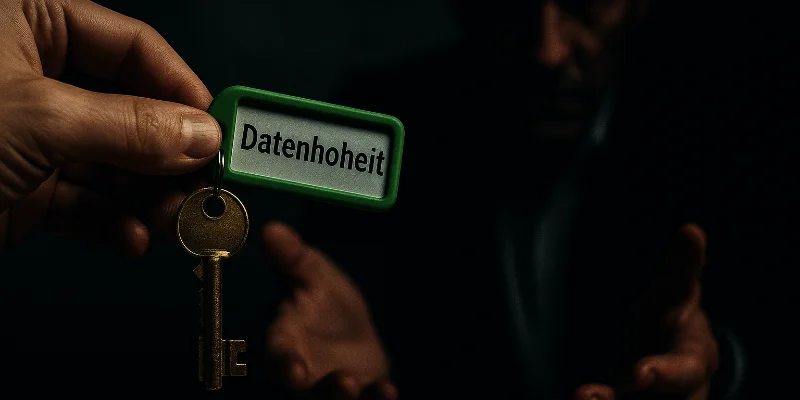
Host Europe migrates email to Microsoft – and SMEs lose data sovereignty
Host Europe has made its move: The provider has announced that all email mailboxes will be migrated to Microsoft 365 starting in May 2025. Anyone who previously trusted their data to servers in Ger...
Updated: 01.04.2025
Learn more
Secure Data Exchange with Clients Made Easy: One-Time Codes and Name Entry with luckycloud
Sharing data with others should be as simple and secure as possible. Companies need to exchange sensitive information with clients, partners, or internal teams—but once a link is shared, it can qui...
Updated: 26.03.2025
Learn more
Less Frustration, More Flow: A Comparison of the Most Popular Tools for Digital Collaboration
Digital communication and collaboration are essential in companies – but often feel more like chaos than productivity. We compare the most common tools and highlight their advantages and disadvanta...
Updated: 21.03.2025
Learn more
luckychat is here! The new open-source messenger from luckycloud for optimal team communication
From now on, luckychat is available as a secure open-source alternative to platforms like Microsoft Teams and Slack for your business! The latest addition to the luckycloud product family guarantee...
Updated: 29.01.2025
Learn more
Cloud and Collaboration Trends 2025: Security and Teamwork in Focus
The IT world is evolving faster than ever – staying ahead means being prepared. 2025 brings groundbreaking advancements in cloud security, hybrid cloud, and digital collaboration tools. Discover th...
Updated: 11.03.2025
Learn more
Secure Alternative to Webex, Zoom, and Co.: luckycloud Launches Solution for Online Meetings
Secure online meetings are a must-have, and video conferencing tools are indispensable in everyday work life. However, providers like Zoom or Webex are heavily criticized due to data privacy issues.
Updated: 11.03.2025
Learn more
Artificial intelligence in the enterprise: How humans and technology become a service dream team
Whether a customer remains loyal to a company or switches to a competitor is increasingly determined by contact with customer service. Today, consumers and business customers alike expect fast and...
Updated: 27.10.2023
Learn more
Protected data rooms: Cloud service for works councils ensures IT independence
Securely storing and processing their own data in the cloud is now part of everyday work for more and more companies. In recent years, they have increasingly introduced new systems, expanded intern...
Updated: 27.10.2023
Learn more
Digitalprämie Berlin - how to benefit from the subsidies with luckycloud
With the digital bonus, the state of Berlin and Investitionsbank Berlin (IBB) want to promote the digitalization of the working world. The acquisition of IT hardware and software for digital transf...
Updated: 07.06.2023
Learn more
Service for cloud solutions: Focus on the customer's needs
Good service pays off - this is also or especially true in difficult times, when the economy is facing numerous challenges due to the Corona pandemic. Only those who convince their customers with a...
Updated: 07.06.2023
Learn more
QNAP NAS and luckycloud - perfect match for Hybrid Clouds
Hybrid Cloud solutions do not have to be complicated. As with all successful combinations, it all depends on the right components! luckycloud - as a secure cloud provider from Germany with the high...
Updated: 07.06.2023
Learn more
All-rounder Hybrid Cloud - clever combination of backup and data processing
IT systems can be affected by failures or maintenance. During this time data in the cloud is not accessible. If you use the cloud storage as pure backup, a failure only affects current changes. But...
Updated: 22.06.2023
Learn more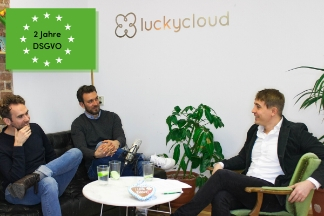
Crash course GDPR - Summary of the 10 most important facts
25 May 2018 - the GDPR came into force on this date. Curse or blessing? After 2 years this is not exactly one of the most popular topics for companies. Nevertheless, the DSGVO has an important sign...
Updated: 07.06.2023
Learn more
Cloud storage in the home office - Set up luckycloud in your home office in 3 steps
There is hardly anyone left who is not affected by the current crisis, let alone severely restricted. Suddenly there are people in the home office who have never (had to) think about how to work ou...
Updated: 22.06.2023
Learn more
Home Office Preparation - Working from home without loss of control
Many managers are currently in conflict over the decision whether to use home office or not. The biggest barrier here is not the technical hurdle, but the feeling of loss of control. Many bosses ar...
Updated: 07.06.2023
Learn more
Home Office Checklist - Corona crisis becomes surveillance scandal 2.0
The corona crisis has stirred up many minds. Many entrepreneurs are interested in a quick solution and forget the daily dangers of digital data processing. People's privacy is sometimes trampled un...
Updated: 07.06.2023
Learn more
Home Office Guide in times of the coronavirus - working fast and safe from home
Current news about the corona virus is piling up. Many send their employees to the home office - but for many industries this is simply impossible. On various platforms there are lists of digital t...
Updated: 07.06.2023
Learn more
A cloud provider from Germany with easy user and data administration was especially important to us!
The demands for schools to be equipped with technical devices, a modern IT infrastructure and secure software solutions are anything but new. This applies to the administration as well as the teach...
Updated: 22.06.2023
Learn more
Why are updates important?
"Again?!", this is the thought you always have when you see a pop up with an update on your computer again. One is simply annoyed and clicks on "Remember later". But this is exactly what you should...
Updated: 07.06.2023
Learn more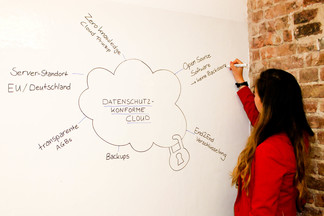
Anniversary of the basic data protection regulation - Part 3 outlook and summary
Indeed, further regulations will follow in the future. With the DSGVO, the basic framework for far-reaching data protection regulation has been established, although the next stage of the DSGVO is...
Updated: 07.06.2023
Learn more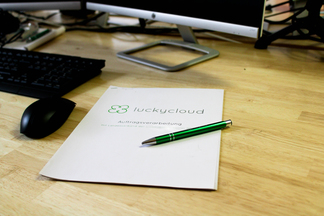
Anniversary of the Basic Data Protection Regulation - Part 2 Travelling in the Cloud as a Business Customer
With the introduction of the DSGVO, the protection of personal data has rightly moved back to the foreground. In this part of the three-part interview with Fresh Compliance, we have clarified for y...
Updated: 07.06.2023
Learn more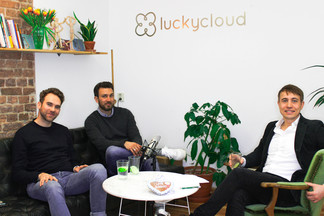
Anniversary of the Basic Data Protection Regulation - Part 1 What is the DSGVO?
One year has now passed since the DSGVO came into force and its introduction caused a lot of unrest and has been hotly debated in recent years, as has the topic of data protection in public clouds....
Updated: 07.06.2023
Learn more
Introduction to luckycloud - Part 2 Collaborative Teamwork with the Team Manager
One has just got used to the old system and then the boss comes around the corner and is of the opinion to integrate a new system because the old one is no longer DSGVO-compliant. The switch to a n...
Updated: 07.06.2023
Learn more
Switching Email Providers with Your Own Domain: What Matters
More and more freelancers and businesses are questioning whether their current email provider still meets their needs. And it’s rarely just about features or pricing. The focus is on control over y...
Updated: 20.01.2026
Learn more
Secure Exchange Alternative: Open-Source Groupware from Germany for Data-Sovereign Teams
More and more companies are reassessing whether their current communication systems still meet their needs. Proprietary platforms like Microsoft Exchange tie users to complex licensing models, rigi...
Updated: 15.10.2025
Learn more
Cloud Storage for Teams: Collaborate Securely, Flexibly, and GDPR-Compliant
A cloud storage solution for teams is indispensable today. Teamwork has long since gone digital: hybrid models and distributed locations are part of everyday life, files need to be available at all...
Updated: 01.10.2025
Learn more
Secure Dropbox Alternatives: Cloud Storage Compared
Dropbox is one of the most well-known cloud storage services worldwide, used by millions of people every day. But a closer look reveals a fundamental privacy issue behind its convenient interface....
Updated: 08.08.2025
Learn more
Cloud Infrastructure for Startups: How to Launch Securely and Scale Confidently
You've taken the first step: the company is founded, the team is motivated. Now you need a digital infrastructure that can keep up with your ideas. What’s often underestimated in practice: choosing...
Updated: 21.05.2025
Learn more
Host Europe migrates email to Microsoft – and SMEs lose data sovereignty
Host Europe has made its move: The provider has announced that all email mailboxes will be migrated to Microsoft 365 starting in May 2025. Anyone who previously trusted their data to servers in Ger...
Updated: 01.04.2025
Learn more
Secure Data Exchange with Clients Made Easy: One-Time Codes and Name Entry with luckycloud
Sharing data with others should be as simple and secure as possible. Companies need to exchange sensitive information with clients, partners, or internal teams—but once a link is shared, it can qui...
Updated: 26.03.2025
Learn more
Less Frustration, More Flow: A Comparison of the Most Popular Tools for Digital Collaboration
Digital communication and collaboration are essential in companies – but often feel more like chaos than productivity. We compare the most common tools and highlight their advantages and disadvanta...
Updated: 21.03.2025
Learn more
luckychat is here! The new open-source messenger from luckycloud for optimal team communication
From now on, luckychat is available as a secure open-source alternative to platforms like Microsoft Teams and Slack for your business! The latest addition to the luckycloud product family guarantee...
Updated: 29.01.2025
Learn more
Cloud and Collaboration Trends 2025: Security and Teamwork in Focus
The IT world is evolving faster than ever – staying ahead means being prepared. 2025 brings groundbreaking advancements in cloud security, hybrid cloud, and digital collaboration tools. Discover th...
Updated: 11.03.2025
Learn more
Secure Alternative to Webex, Zoom, and Co.: luckycloud Launches Solution for Online Meetings
Secure online meetings are a must-have, and video conferencing tools are indispensable in everyday work life. However, providers like Zoom or Webex are heavily criticized due to data privacy issues.
Updated: 11.03.2025
Learn more
Artificial intelligence in the enterprise: How humans and technology become a service dream team
Whether a customer remains loyal to a company or switches to a competitor is increasingly determined by contact with customer service. Today, consumers and business customers alike expect fast and...
Updated: 27.10.2023
Learn more
Protected data rooms: Cloud service for works councils ensures IT independence
Securely storing and processing their own data in the cloud is now part of everyday work for more and more companies. In recent years, they have increasingly introduced new systems, expanded intern...
Updated: 27.10.2023
Learn more
Digitalprämie Berlin - how to benefit from the subsidies with luckycloud
With the digital bonus, the state of Berlin and Investitionsbank Berlin (IBB) want to promote the digitalization of the working world. The acquisition of IT hardware and software for digital transf...
Updated: 07.06.2023
Learn more
Service for cloud solutions: Focus on the customer's needs
Good service pays off - this is also or especially true in difficult times, when the economy is facing numerous challenges due to the Corona pandemic. Only those who convince their customers with a...
Updated: 07.06.2023
Learn more
QNAP NAS and luckycloud - perfect match for Hybrid Clouds
Hybrid Cloud solutions do not have to be complicated. As with all successful combinations, it all depends on the right components! luckycloud - as a secure cloud provider from Germany with the high...
Updated: 07.06.2023
Learn more
All-rounder Hybrid Cloud - clever combination of backup and data processing
IT systems can be affected by failures or maintenance. During this time data in the cloud is not accessible. If you use the cloud storage as pure backup, a failure only affects current changes. But...
Updated: 22.06.2023
Learn more
Crash course GDPR - Summary of the 10 most important facts
25 May 2018 - the GDPR came into force on this date. Curse or blessing? After 2 years this is not exactly one of the most popular topics for companies. Nevertheless, the DSGVO has an important sign...
Updated: 07.06.2023
Learn more
Cloud storage in the home office - Set up luckycloud in your home office in 3 steps
There is hardly anyone left who is not affected by the current crisis, let alone severely restricted. Suddenly there are people in the home office who have never (had to) think about how to work ou...
Updated: 22.06.2023
Learn more
Home Office Preparation - Working from home without loss of control
Many managers are currently in conflict over the decision whether to use home office or not. The biggest barrier here is not the technical hurdle, but the feeling of loss of control. Many bosses ar...
Updated: 07.06.2023
Learn more
Home Office Checklist - Corona crisis becomes surveillance scandal 2.0
The corona crisis has stirred up many minds. Many entrepreneurs are interested in a quick solution and forget the daily dangers of digital data processing. People's privacy is sometimes trampled un...
Updated: 07.06.2023
Learn more
Home Office Guide in times of the coronavirus - working fast and safe from home
Current news about the corona virus is piling up. Many send their employees to the home office - but for many industries this is simply impossible. On various platforms there are lists of digital t...
Updated: 07.06.2023
Learn more
A cloud provider from Germany with easy user and data administration was especially important to us!
The demands for schools to be equipped with technical devices, a modern IT infrastructure and secure software solutions are anything but new. This applies to the administration as well as the teach...
Updated: 22.06.2023
Learn more
Why are updates important?
"Again?!", this is the thought you always have when you see a pop up with an update on your computer again. One is simply annoyed and clicks on "Remember later". But this is exactly what you should...
Updated: 07.06.2023
Learn more
Anniversary of the basic data protection regulation - Part 3 outlook and summary
Indeed, further regulations will follow in the future. With the DSGVO, the basic framework for far-reaching data protection regulation has been established, although the next stage of the DSGVO is...
Updated: 07.06.2023
Learn more
Anniversary of the Basic Data Protection Regulation - Part 2 Travelling in the Cloud as a Business Customer
With the introduction of the DSGVO, the protection of personal data has rightly moved back to the foreground. In this part of the three-part interview with Fresh Compliance, we have clarified for y...
Updated: 07.06.2023
Learn more
Anniversary of the Basic Data Protection Regulation - Part 1 What is the DSGVO?
One year has now passed since the DSGVO came into force and its introduction caused a lot of unrest and has been hotly debated in recent years, as has the topic of data protection in public clouds....
Updated: 07.06.2023
Learn more
Introduction to luckycloud - Part 2 Collaborative Teamwork with the Team Manager
One has just got used to the old system and then the boss comes around the corner and is of the opinion to integrate a new system because the old one is no longer DSGVO-compliant. The switch to a n...
Updated: 07.06.2023
Learn more
Switching Email Providers with Your Own Domain: What Matters
More and more freelancers and businesses are questioning whether their current email provider still meets their needs. And it’s rarely just about features or pricing. The focus is on control over y...
Updated: 20.01.2026
Learn more
Secure Exchange Alternative: Open-Source Groupware from Germany for Data-Sovereign Teams
More and more companies are reassessing whether their current communication systems still meet their needs. Proprietary platforms like Microsoft Exchange tie users to complex licensing models, rigi...
Updated: 15.10.2025
Learn more
Cloud Storage for Teams: Collaborate Securely, Flexibly, and GDPR-Compliant
A cloud storage solution for teams is indispensable today. Teamwork has long since gone digital: hybrid models and distributed locations are part of everyday life, files need to be available at all...
Updated: 01.10.2025
Learn more
Secure Dropbox Alternatives: Cloud Storage Compared
Dropbox is one of the most well-known cloud storage services worldwide, used by millions of people every day. But a closer look reveals a fundamental privacy issue behind its convenient interface....
Updated: 08.08.2025
Learn more
Cloud Infrastructure for Startups: How to Launch Securely and Scale Confidently
You've taken the first step: the company is founded, the team is motivated. Now you need a digital infrastructure that can keep up with your ideas. What’s often underestimated in practice: choosing...
Updated: 21.05.2025
Learn more
Host Europe migrates email to Microsoft – and SMEs lose data sovereignty
Host Europe has made its move: The provider has announced that all email mailboxes will be migrated to Microsoft 365 starting in May 2025. Anyone who previously trusted their data to servers in Ger...
Updated: 01.04.2025
Learn more
Secure Data Exchange with Clients Made Easy: One-Time Codes and Name Entry with luckycloud
Sharing data with others should be as simple and secure as possible. Companies need to exchange sensitive information with clients, partners, or internal teams—but once a link is shared, it can qui...
Updated: 26.03.2025
Learn more
Less Frustration, More Flow: A Comparison of the Most Popular Tools for Digital Collaboration
Digital communication and collaboration are essential in companies – but often feel more like chaos than productivity. We compare the most common tools and highlight their advantages and disadvanta...
Updated: 21.03.2025
Learn more
luckychat is here! The new open-source messenger from luckycloud for optimal team communication
From now on, luckychat is available as a secure open-source alternative to platforms like Microsoft Teams and Slack for your business! The latest addition to the luckycloud product family guarantee...
Updated: 29.01.2025
Learn more
Cloud and Collaboration Trends 2025: Security and Teamwork in Focus
The IT world is evolving faster than ever – staying ahead means being prepared. 2025 brings groundbreaking advancements in cloud security, hybrid cloud, and digital collaboration tools. Discover th...
Updated: 11.03.2025
Learn more
Secure Alternative to Webex, Zoom, and Co.: luckycloud Launches Solution for Online Meetings
Secure online meetings are a must-have, and video conferencing tools are indispensable in everyday work life. However, providers like Zoom or Webex are heavily criticized due to data privacy issues.
Updated: 11.03.2025
Learn more
Artificial intelligence in the enterprise: How humans and technology become a service dream team
Whether a customer remains loyal to a company or switches to a competitor is increasingly determined by contact with customer service. Today, consumers and business customers alike expect fast and...
Updated: 27.10.2023
Learn more
Protected data rooms: Cloud service for works councils ensures IT independence
Securely storing and processing their own data in the cloud is now part of everyday work for more and more companies. In recent years, they have increasingly introduced new systems, expanded intern...
Updated: 27.10.2023
Learn more
Digitalprämie Berlin - how to benefit from the subsidies with luckycloud
With the digital bonus, the state of Berlin and Investitionsbank Berlin (IBB) want to promote the digitalization of the working world. The acquisition of IT hardware and software for digital transf...
Updated: 07.06.2023
Learn more
Service for cloud solutions: Focus on the customer's needs
Good service pays off - this is also or especially true in difficult times, when the economy is facing numerous challenges due to the Corona pandemic. Only those who convince their customers with a...
Updated: 07.06.2023
Learn more
QNAP NAS and luckycloud - perfect match for Hybrid Clouds
Hybrid Cloud solutions do not have to be complicated. As with all successful combinations, it all depends on the right components! luckycloud - as a secure cloud provider from Germany with the high...
Updated: 07.06.2023
Learn more
All-rounder Hybrid Cloud - clever combination of backup and data processing
IT systems can be affected by failures or maintenance. During this time data in the cloud is not accessible. If you use the cloud storage as pure backup, a failure only affects current changes. But...
Updated: 22.06.2023
Learn more
Crash course GDPR - Summary of the 10 most important facts
25 May 2018 - the GDPR came into force on this date. Curse or blessing? After 2 years this is not exactly one of the most popular topics for companies. Nevertheless, the DSGVO has an important sign...
Updated: 07.06.2023
Learn more
Cloud storage in the home office - Set up luckycloud in your home office in 3 steps
There is hardly anyone left who is not affected by the current crisis, let alone severely restricted. Suddenly there are people in the home office who have never (had to) think about how to work ou...
Updated: 22.06.2023
Learn more
Home Office Preparation - Working from home without loss of control
Many managers are currently in conflict over the decision whether to use home office or not. The biggest barrier here is not the technical hurdle, but the feeling of loss of control. Many bosses ar...
Updated: 07.06.2023
Learn more
Home Office Checklist - Corona crisis becomes surveillance scandal 2.0
The corona crisis has stirred up many minds. Many entrepreneurs are interested in a quick solution and forget the daily dangers of digital data processing. People's privacy is sometimes trampled un...
Updated: 07.06.2023
Learn more
Home Office Guide in times of the coronavirus - working fast and safe from home
Current news about the corona virus is piling up. Many send their employees to the home office - but for many industries this is simply impossible. On various platforms there are lists of digital t...
Updated: 07.06.2023
Learn more
A cloud provider from Germany with easy user and data administration was especially important to us!
The demands for schools to be equipped with technical devices, a modern IT infrastructure and secure software solutions are anything but new. This applies to the administration as well as the teach...
Updated: 22.06.2023
Learn more
Why are updates important?
"Again?!", this is the thought you always have when you see a pop up with an update on your computer again. One is simply annoyed and clicks on "Remember later". But this is exactly what you should...
Updated: 07.06.2023
Learn more
Anniversary of the basic data protection regulation - Part 3 outlook and summary
Indeed, further regulations will follow in the future. With the DSGVO, the basic framework for far-reaching data protection regulation has been established, although the next stage of the DSGVO is...
Updated: 07.06.2023
Learn more
Anniversary of the Basic Data Protection Regulation - Part 2 Travelling in the Cloud as a Business Customer
With the introduction of the DSGVO, the protection of personal data has rightly moved back to the foreground. In this part of the three-part interview with Fresh Compliance, we have clarified for y...
Updated: 07.06.2023
Learn more
Anniversary of the Basic Data Protection Regulation - Part 1 What is the DSGVO?
One year has now passed since the DSGVO came into force and its introduction caused a lot of unrest and has been hotly debated in recent years, as has the topic of data protection in public clouds....
Updated: 07.06.2023
Learn more
Introduction to luckycloud - Part 2 Collaborative Teamwork with the Team Manager
One has just got used to the old system and then the boss comes around the corner and is of the opinion to integrate a new system because the old one is no longer DSGVO-compliant. The switch to a n...
Updated: 07.06.2023
Learn more
Switching Email Providers with Your Own Domain: What Matters
More and more freelancers and businesses are questioning whether their current email provider still meets their needs. And it’s rarely just about features or pricing. The focus is on control over y...
Updated: 20.01.2026
Learn more
Secure Exchange Alternative: Open-Source Groupware from Germany for Data-Sovereign Teams
More and more companies are reassessing whether their current communication systems still meet their needs. Proprietary platforms like Microsoft Exchange tie users to complex licensing models, rigi...
Updated: 15.10.2025
Learn more
Cloud Storage for Teams: Collaborate Securely, Flexibly, and GDPR-Compliant
A cloud storage solution for teams is indispensable today. Teamwork has long since gone digital: hybrid models and distributed locations are part of everyday life, files need to be available at all...
Updated: 01.10.2025
Learn more
Secure Dropbox Alternatives: Cloud Storage Compared
Dropbox is one of the most well-known cloud storage services worldwide, used by millions of people every day. But a closer look reveals a fundamental privacy issue behind its convenient interface....
Updated: 08.08.2025
Learn more
Cloud Infrastructure for Startups: How to Launch Securely and Scale Confidently
You've taken the first step: the company is founded, the team is motivated. Now you need a digital infrastructure that can keep up with your ideas. What’s often underestimated in practice: choosing...
Updated: 21.05.2025
Learn more
Host Europe migrates email to Microsoft – and SMEs lose data sovereignty
Host Europe has made its move: The provider has announced that all email mailboxes will be migrated to Microsoft 365 starting in May 2025. Anyone who previously trusted their data to servers in Ger...
Updated: 01.04.2025
Learn more
Secure Data Exchange with Clients Made Easy: One-Time Codes and Name Entry with luckycloud
Sharing data with others should be as simple and secure as possible. Companies need to exchange sensitive information with clients, partners, or internal teams—but once a link is shared, it can qui...
Updated: 26.03.2025
Learn more
Less Frustration, More Flow: A Comparison of the Most Popular Tools for Digital Collaboration
Digital communication and collaboration are essential in companies – but often feel more like chaos than productivity. We compare the most common tools and highlight their advantages and disadvanta...
Updated: 21.03.2025
Learn more
luckychat is here! The new open-source messenger from luckycloud for optimal team communication
From now on, luckychat is available as a secure open-source alternative to platforms like Microsoft Teams and Slack for your business! The latest addition to the luckycloud product family guarantee...
Updated: 29.01.2025
Learn more
Cloud and Collaboration Trends 2025: Security and Teamwork in Focus
The IT world is evolving faster than ever – staying ahead means being prepared. 2025 brings groundbreaking advancements in cloud security, hybrid cloud, and digital collaboration tools. Discover th...
Updated: 11.03.2025
Learn more
Secure Alternative to Webex, Zoom, and Co.: luckycloud Launches Solution for Online Meetings
Secure online meetings are a must-have, and video conferencing tools are indispensable in everyday work life. However, providers like Zoom or Webex are heavily criticized due to data privacy issues.
Updated: 11.03.2025
Learn more
Artificial intelligence in the enterprise: How humans and technology become a service dream team
Whether a customer remains loyal to a company or switches to a competitor is increasingly determined by contact with customer service. Today, consumers and business customers alike expect fast and...
Updated: 27.10.2023
Learn more
Protected data rooms: Cloud service for works councils ensures IT independence
Securely storing and processing their own data in the cloud is now part of everyday work for more and more companies. In recent years, they have increasingly introduced new systems, expanded intern...
Updated: 27.10.2023
Learn more
Digitalprämie Berlin - how to benefit from the subsidies with luckycloud
With the digital bonus, the state of Berlin and Investitionsbank Berlin (IBB) want to promote the digitalization of the working world. The acquisition of IT hardware and software for digital transf...
Updated: 07.06.2023
Learn more
Service for cloud solutions: Focus on the customer's needs
Good service pays off - this is also or especially true in difficult times, when the economy is facing numerous challenges due to the Corona pandemic. Only those who convince their customers with a...
Updated: 07.06.2023
Learn more
QNAP NAS and luckycloud - perfect match for Hybrid Clouds
Hybrid Cloud solutions do not have to be complicated. As with all successful combinations, it all depends on the right components! luckycloud - as a secure cloud provider from Germany with the high...
Updated: 07.06.2023
Learn more
All-rounder Hybrid Cloud - clever combination of backup and data processing
IT systems can be affected by failures or maintenance. During this time data in the cloud is not accessible. If you use the cloud storage as pure backup, a failure only affects current changes. But...
Updated: 22.06.2023
Learn more
Crash course GDPR - Summary of the 10 most important facts
25 May 2018 - the GDPR came into force on this date. Curse or blessing? After 2 years this is not exactly one of the most popular topics for companies. Nevertheless, the DSGVO has an important sign...
Updated: 07.06.2023
Learn more
Cloud storage in the home office - Set up luckycloud in your home office in 3 steps
There is hardly anyone left who is not affected by the current crisis, let alone severely restricted. Suddenly there are people in the home office who have never (had to) think about how to work ou...
Updated: 22.06.2023
Learn more
Home Office Preparation - Working from home without loss of control
Many managers are currently in conflict over the decision whether to use home office or not. The biggest barrier here is not the technical hurdle, but the feeling of loss of control. Many bosses ar...
Updated: 07.06.2023
Learn more
Home Office Checklist - Corona crisis becomes surveillance scandal 2.0
The corona crisis has stirred up many minds. Many entrepreneurs are interested in a quick solution and forget the daily dangers of digital data processing. People's privacy is sometimes trampled un...
Updated: 07.06.2023
Learn more
Home Office Guide in times of the coronavirus - working fast and safe from home
Current news about the corona virus is piling up. Many send their employees to the home office - but for many industries this is simply impossible. On various platforms there are lists of digital t...
Updated: 07.06.2023
Learn more
A cloud provider from Germany with easy user and data administration was especially important to us!
The demands for schools to be equipped with technical devices, a modern IT infrastructure and secure software solutions are anything but new. This applies to the administration as well as the teach...
Updated: 22.06.2023
Learn more
Why are updates important?
"Again?!", this is the thought you always have when you see a pop up with an update on your computer again. One is simply annoyed and clicks on "Remember later". But this is exactly what you should...
Updated: 07.06.2023
Learn more
Anniversary of the basic data protection regulation - Part 3 outlook and summary
Indeed, further regulations will follow in the future. With the DSGVO, the basic framework for far-reaching data protection regulation has been established, although the next stage of the DSGVO is...
Updated: 07.06.2023
Learn more
Anniversary of the Basic Data Protection Regulation - Part 2 Travelling in the Cloud as a Business Customer
With the introduction of the DSGVO, the protection of personal data has rightly moved back to the foreground. In this part of the three-part interview with Fresh Compliance, we have clarified for y...
Updated: 07.06.2023
Learn more
Anniversary of the Basic Data Protection Regulation - Part 1 What is the DSGVO?
One year has now passed since the DSGVO came into force and its introduction caused a lot of unrest and has been hotly debated in recent years, as has the topic of data protection in public clouds....
Updated: 07.06.2023
Learn more
Introduction to luckycloud - Part 2 Collaborative Teamwork with the Team Manager
One has just got used to the old system and then the boss comes around the corner and is of the opinion to integrate a new system because the old one is no longer DSGVO-compliant. The switch to a n...
Updated: 07.06.2023
Learn more



























